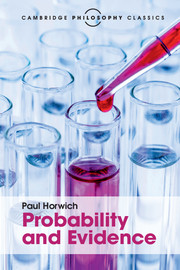Summary
Introduction
This book is about scientific knowledge, particularly the concept of evidence. Its purpose is to explore scientific methodology in light of the obvious yet frequently neglected fact that belief is not an all-or-nothing matter, but is susceptible to varying degrees of intensity. More specifically, my main object is to exploit this fact to treat certain well-known puzzles in the philosophy of science, such as the problem of induction and the paradox of confirmation, as well as questions about ad hoc postulates, the tenability of realism, statistical testing, the relative merits of prediction and accommodation, a special quality of varied data, and the evidential value of further information. My second aim is to display the extent to which diverse elements of scientific method may be unified and justified by means of the concept of subjective probability. These two projects are intimately related. The probabilistic terms in which our evidential ideas will be formulated should promote clarity and accuracy, dispel confusion, and thereby facilitate the primary task. I should stress that this main goal is not to propound or defend a theory of the scientific method, either normative or descriptive, but rather to solve various paradoxical problems. I cannot now adequately describe the conception of philosophy which promotes this distinction and motivates my approach; but I think that some appreciation of that metaphilosophical perspective is needed to understand properly what is being attempted here and to pre-empt certain objections. I hope the following sketch will be better than nothing.
In a way, philosophy contains science and art. For there are philosophical research programmes whose methodology is scientific and others in which aesthetic standards prevail. Investigations into the semantics of natural languages, systematisations of basic ethical judgements, conceptual analyses – attempts to formulate necessary and sufficient conditions for S knows p, x causes γ, and w refers to z – these typify scientific philosophy. Their object is a justified account of certain phenomena – a simple theory designed to accommodate the relevant data provided, usually, by intuition.
- Type
- Chapter
- Information
- Probability and Evidence , pp. 1 - 14Publisher: Cambridge University PressPrint publication year: 2016

